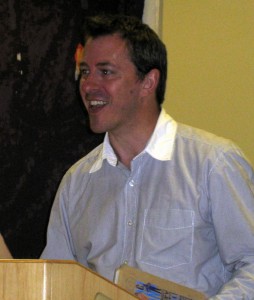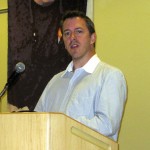The biggest dangers in the ocean
The biggest dangers in the ocean are created by people. In fact, the world's biggest landfill is in the Pacific Ocean. It is now documented that are huge garbage patches in each of the oceans.
The biggest dangers in the ocean are created by people. In fact, the world's biggest landfill is in the Pacific Ocean. It is now documented that are huge garbage patches in each of the oceans.
If you want to better imaging the size of the Gulf of Mexico oil spill, use this website to move it to your home, or to anywhere else (I was especially aghast when
If you’d like to hear some upbeat ideas and inspiration for weaning ourselves off of oil, watch this video of Amy Goodman’s round table featuring Sierra Club Exec Director Michael Brune and Rocky Mountain Institute Scientist Amory Lovins. Whereas many people have harshly criticized Obama’s recent speech regarding the Gulf tragedy, Lovins sees a significant policy shift. He notes that President Obama is now seeking to end our addition to all fossil fuels, not just oil. Second, he heard a new approach to consensus building:
[H]e pointed out that this has cost—our dependence on fossil fuel has cost not only to our economy but also to our national security and our environment. And I think that starts a new conversation of a new kind in energy policy, because we’ve always supposed people had to want the same things we wanted in energy for the same reasons. So if you had different priorities than somebody else, you couldn’t agree on the outcome. What the President started to do here is to say, let’s focus on outcomes, not motives, and then we can build a strong consensus. Whether you care most about national security or environment or economy, we ought to do the same things about energy. And if we do the things we agree about, then the things we don’t agree about become superfluous.Lovins mentioned several effective techniques for reducing our use of fossil fuels. For example, we can use “freebates,” whereby those who insist on purchasing less efficient products are hit with surcharges that directly flow to reducing the prices of more efficient products. France used this approach regarding automobiles two years ago and cut the sales of inefficient cars by 40%. Doing things like this will “align the incentives, which will change behavior.” Lovins also stresses that more states need to use the energy utility model employed by California and Oregon, whereby the utilities are rewarded by cutting our use of fuel rather than by selling us more fuel. He further indicates that most of the electricity we use is completely wasted. He is a big fan of “net metering,” whereby those who produce more electricity than they use (e.g., by use of solar panels) can make money by running their meters backwards and selling that energy to their electric utility. A dramatic illustration of what we could look forward to comes at the 38 minute mark, where Lovins describes his own 4,000 square foot incredibly energy efficient home near Aspen. Of course, many Americans will hate these ideas. They will see nothing by deprivation, and they’ll fail to see the immense benefits for making big changes in how we make and use energy. Bob Cesca senses this too, and suggests that this is why President Obama ended his speech by asking Americans to pray, rather than telling us to get ready to make changes in our lives.
The president wrapped up his address Tuesday night by asking Americans to pray for the victims -- both human and environmental -- of the BP oil spill. I thought it was a strange way to end his first Oval Office address during a national emergency insofar as praying makes the situation appear too big for conventional solutions. As though all that remains between us and a sea of oil is the Hail Mary. This morning it occurred to me that this was the only thing he could really ask Americans to do.Why? Simply stated, it doesn't require any effort to silently invoke spirituality while stopped at a traffic signal . . .
What should Obama have done rather than invoking supernatural beings?Instead of prayer, the president could have asked us all to make sacrifices towards the goal of weaning ourselves off of fossil fuels. Maybe he should have asked for sacrifice. It probably wouldn't have hurt. But it would have been mostly ignored. Americans simply don't do "national sacrifice" anymore.I’m concerned that Cesca is correct, but I still hold out hope. I suspect that the reason that so many American resist doing anything is because they don’t want to be doing something while others are doing nothing. They don’t want to be seen as suckers. Therefore, our aim should be to make it clear that we’re all going to do this together. We’re need to let everyone know that we're all going to hold hands and jump in.
The events since the BP well exploded and began spewing oil and gas into the Gulf of Mexico have forced President Obama's hand. No politician wants to be the one to catch the Peak Oil hot potato, but it looks like it's landed right in Obama's lap. In his Oval Office speech the other night, he came the closest any president has yet to frankly discussing the challenges we face (emphasis mine):
So one of the lessons we’ve learned from this spill is that we need better regulations, better safety standards, and better enforcement when it comes to offshore drilling. But a larger lesson is that no matter how much we improve our regulation of the industry, drilling for oil these days entails greater risk. After all, oil is a finite resource. We consume more than 20 percent of the world’s oil, but have less than 2 percent of the world’s oil reserves. And that’s part of the reason oil companies are drilling a mile beneath the surface of the ocean -- because we’re running out of places to drill on land and in shallow water. For decades, we have known the days of cheap and easily accessible oil were numbered. For decades, we’ve talked and talked about the need to end America’s century-long addiction to fossil fuels. And for decades, we have failed to act with the sense of urgency that this challenge requires. Time and again, the path forward has been blocked -- not only by oil industry lobbyists, but also by a lack of political courage and candor. The consequences of our inaction are now in plain sight.
A few days ago, Colin Beavan ("No Impact Man") came to St. Louis to discuss his book (at one of the branches of the St. Louis Public Library). I have previously posted on his fine book. I did so because I was impressed that Beavan was actually doing something to dramatically decrease his impact on the planet rather than simply talking about doing something.
Beavan offered much good advice at his recent talk. In his book, he offered lots of nuts and bolts about lessening one's impact on the planet. At last week's talk, he focused quite a bit on motivating us to change ourselves. Here are some of his points:
- "I'm the only person I can change."
- There are 14,000 dead lakes in the United States and Canada, lakes that used to have water.
- In the UK, the political parties strive to show who can do more to save the environment, which is dramatically different than it is in the United States.
- "Just look around this room . . . How cool are libraries! What a great model, sharing things--passing them from person to person."
-"What I did was always intended to have an element of stunt."
- The best thing about my year-long experiment was getting rid of television.
- The average American throws away 40 items of clothing per year.
- The hardest part about getting anything done to lessen the impact of people on our environment is "changing habits."
- Americans are overworked so much that they don't have the time to spend with their loved ones. "We are out of balance."
- "Where do I find the time to make bread?"
- Progress "might not mean more technology."
- The average American watches 4.5 hours of television per day.
- "We've got to stop thinking that environmentalism is about deprivation."
 - Car-based urban planning leads to obesity and loneliness.
- The interests of the people must be aligned with the interests of the planet. We need to make personal and business decisions that are in line with our values. When we do this, our institutions will become more functional.
- If someone who resists says that he is concerned about national security, ask him why he would want to rely upon unstable regimes for energy.
- The wastebasket was not invented until 1900.
- The problem about our environment is not about good and evil. It's about systems that are not working.
- We all have the capacity to do good. Use your talents to make a difference.
- when someone comes up to me and says "you should talk about X," I tell them "no, YOU should talk about X."
-To are the straws that broke the camel's back. Anyone can be a hero.
- We have a choice. You can be the victim of your culture or you can be the master of your culture.
- There is no profit in local farming. Please support them, and you'll be proud.
- "No-impact is not a religion."
- Beware of talk about carbon offsets. It doesn't undo the damage. I call it "carbon penitence." It's not a bad thing, but we should instead find renewable energy and invest in it.
- How can we change other people? "Listen and love instead of telling and anger."
- Car-based urban planning leads to obesity and loneliness.
- The interests of the people must be aligned with the interests of the planet. We need to make personal and business decisions that are in line with our values. When we do this, our institutions will become more functional.
- If someone who resists says that he is concerned about national security, ask him why he would want to rely upon unstable regimes for energy.
- The wastebasket was not invented until 1900.
- The problem about our environment is not about good and evil. It's about systems that are not working.
- We all have the capacity to do good. Use your talents to make a difference.
- when someone comes up to me and says "you should talk about X," I tell them "no, YOU should talk about X."
-To are the straws that broke the camel's back. Anyone can be a hero.
- We have a choice. You can be the victim of your culture or you can be the master of your culture.
- There is no profit in local farming. Please support them, and you'll be proud.
- "No-impact is not a religion."
- Beware of talk about carbon offsets. It doesn't undo the damage. I call it "carbon penitence." It's not a bad thing, but we should instead find renewable energy and invest in it.
- How can we change other people? "Listen and love instead of telling and anger."